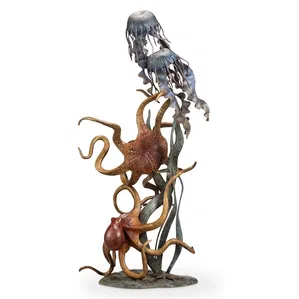
SPI Sculptures — Undersea Wonders Quartet (Octopuses and Jellyfish) - Sculpture
Dim: 51"H 28"W 20.5"D

Dim: 51"H 28"W 20.5"D
Dim: 16.5" tall x 11.5" wide x 5" deep
Dim: 14.5" tall x 12.5" wide 5 " deep
Established in 1973, SPI has become one of the most exciting Home Décor, Garden and Gallery vendors in the industry. We enjoy the benefits of designing our own unique products and controlling the manufacturing process. With manufacturing plants in China and established partners throughout Asia, SPI has the advantage offering our customers innovative and provocative designs at affordable prices. Our diverse selection of products is valued by prominent interior designers and home décor specialists.